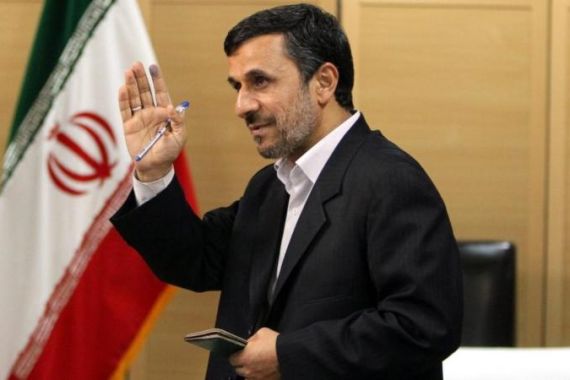Ahmadinejad’s support in parliament wanes
Final results for parliamentary runoff election show Iran’s president losing seats to conservative rivals.

Mahmoud Ahmadinejad, Iran’s president, has suffered a setback in parliament with his supporters losing seats as conservative rivals consolidated their hold on the legislative body.
Final results for the parliamentary runoff election were released on Saturday, showing that Ahmadinejad’s supporters are hugely outnumbered by conservatives who once backed him.
A robust turnout for Friday’s vote was seen as a show of support for the country’s religious leadership, with the president appearing to have fallen out of favour with Iran’s top cleric, Ayatollah Ali Khamenei.
Ahmadinejad’s political decline started last year with his bold but failed challenge to Khamenei over the choice of intelligence chief.
While usually in agreement with the conservatives on foreign policy and many other issues, Ahmadinejad had tried to change the rules of the political game in Iran, where the president and legislature are subordinate to religious figures like Khamenei.
Sadegh Zibakalam, professor or politics at Tehran University, told Al Jazeera that Ahmadinejad may not have too much to worry about.
“Ahmadinejad’s power in the parliament has not altered a great deal. There are many of his supporters entering the parliament, but not saying that they are his supporters,” Zibakalam said.
“Because of the rifts with Ayatollah Ali Khamenei, many of Ahmadinejad’s supporters are bit reluctant to say so openly.”
No third term
Ahmadinejad’s opponents had already won an outright majority in the 290-member legislature in the first round of voting in March.
Of 65 seats up for grabs in Friday’s runoff election, Ahmadinejad’s opponents won 41 while the president’s supporters got only 13 seats.
Independents won 11, according to final results reported Saturday by state media.
There were no claims of irregularities – which touched off huge protests over the presidential election in 2009 after accusations the results were rigged.
Iran’s major reformist parties, which oppose both Ahmadinejad and the conservatives, mostly did not field candidates in the runoff.
The new parliament will begin its sessions in late May.
It has no direct control over key foreign and security policy matters like Iran’s nuclear programme, but it can influence those issues and economic policies as well as the run-up to the election of Ahmadinejad’s successor.
Ahmadinejad is constitutionally barred from seeking a third consecutive four-year term.
The results suggest Ahmadinejad will face a more belligerent parliament in the remaining time of his second four-year term in office that ends August 2013.
Zibakalam said that the key issue of the next presidential elections will “not be with the conservatives, but whether or not the reformists will be allowed to enter the race”.
“If they are allowed, I think they will topple the vote,” he said.
High voter turnout
No final figures were released, but Iran’s media said that the turnout on Saturday matched that of the initial round of voting on March 2, when 64 per cent of voters reportedly cast ballots.
“Mass turnout in runoff parliamentary elections,” declared a front-page headline in the government-run Iran Daily.
Iranian leaders have showcased the high voter turnout as a sign of trust in the clerical-led system and rejection of Western pressure over the nuclear issue.
The West accuses Iran of pursuing nuclear weapons and is demanding that Iran stop uranium enrichment.
Iran has refused, saying its programme is aimed at furthering power generation and cancer treatments.
“The vote is support for the ruling system as it faces the US and its allies over the nuclear program … The vote also means that tensions will increase between Ahmadinejad and his opponents in the incoming parliament,”Ali Reza Khamesian, a political analyst, said.
Khamesian said Ahmadinejad was gradually fading from Iran’s political scene but could still stir up conflict with parliament.
“Ahmadinejad is the losing party. So, he will try to create tensions in the hope of getting concessions,” he said.
The outgoing parliament and Ahmadinejad are at loggerheads over how quickly to slash food and energy subsidies.
The president favours dramatic cuts to boost Iran’s ailing economy by reducing the massive drain on the state budget from the subsidies.
The government implemented a first phase of slashing subsidies in December 2010.
Gasoline prices quadrupled and bread prices tripled after the cuts came into effect.
Prices have also increased in recent months, partly as a result of sanctions over Iran’s nuclear programme, as well as news that the government is considering ending subsidies altogether.